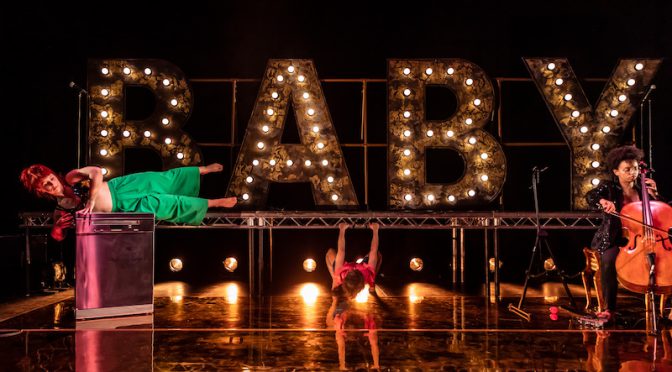By Subha Robert William
RashDash’s Oh Mother opens up with mess. Abi and Helen find themselves in a place of undoing. As they are left with just five minutes before the show starts, things around them are in disarray. A dishwasher, baby toys, toy babies, nappies and a cello set the scene. They apologise to the crowd for the clutter. But instead of coaxing these things into a tidy assemblage, they find a resolve in embracing the untidiness. Throughout the play, societal expectations are challenged and overturned. But there is no simple fix to the unexpected and ceaseless demands that motherhood entails. Instead, the performers lay bare their own self-reflexive ponderings. What does it mean to be vulnerable while caring for another individual? How do we care for and nurture relationships both to ourselves and to the people around us?
The scenes are barely linear, throwing out assumptions that plot and narrative have to coexist. Instead, in weaving together rich and purposeful vignettes of monologues, truthful conversations, song and movement, we are taken on an expansive and imaginative journey where multitudes of contrasting emotions of experiencing motherhood are celebrated and approached with care.

Image credit: https://sohotheatre.com/shows/oh-mother/
The play is only made buoyant by Simone Seal’s glorious melodic cello compositions which create an atmosphere of gentleness and calm amidst the chaos and noise of everyday life. Simone’s exquisite compositional skills is not their only gift. Their versatility in navigating their role as both parent and child is carefully executed. In a scene with Helen Goalen who plays the role of Simone’s parent, we witness Simone stripped to their rawest and vulnerable form as they confront their mother’s refusal to accept their gender as non-binary
While moments like these demand emotionally charged dialogues, other scenes which require such confrontations are often conveyed in dance sequences. In routines between Abi and Helen, where they take on the role of co-parents, their careful and considered movements find their bodies intuitively moving closer towards each other. In the midst of their contemporary sequence, their growing irritation of each other is briefly suspended as their bodies intertwine. At other times, their bodies are moulded and morphed to fulfil different roles. In one sequence, Helen folds her body into the dishwasher to escape a persistently crying baby.
Though it may seem that the sequences of scenes move quickly from one to another as they take on a breadth of issues around motherhood (loss, love, anxiety, and grief), the poignant and poetic dialogues facilitate a nuanced dissection of each of these experience. By the end of the play we are left with a powerfully evocative and raw portrayal of motherhood, one that inspires us to dream of better worlds in the process.
Subha is a final year PhD candidate at the English department, researching Archaeology, Literature and Women in the 19thc provincial press.
Blog posts on King’s English represent the views of the individual authors and neither those of the English Department, nor of King’s College London.
You may also like to read:

